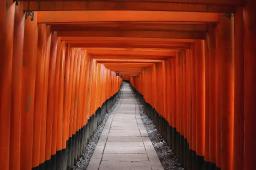
Japan is a country steeped in history, culture, and breathtaking natural beauty. One of its most iconic and mesmerizing destinations is the Fushimi Inari Shrine, located in Kyoto. This Shinto shrine, dedicated to the deity Inari, is a must-visit for anyone seeking to experience the true essence of Japan’s spiritual heritage. In this blog post, we will explore the history, significance, and allure of this enchanting shrine.
Established in 711 AD, the Fushimi Inari Shrine is the head shrine for the more than 30,000 Inari shrines scattered across Japan. Inari is the Shinto god of rice, agriculture, and prosperity, often depicted as a fox or accompanied by fox messengers. The shrine’s significance has grown over the centuries, and today, it is not only visited by those seeking agricultural blessings, but also by those wishing for success in business and other aspects of life.
Perhaps the most striking feature of Fushimi Inari Shrine is the seemingly endless rows of vermilion torii gates that line the pathways up Mount Inari. These gates, numbering over 10,000, have been donated by individuals, families, and businesses seeking blessings and prosperity. As visitors walk beneath the gates, they are transported to a spiritual realm, where the line between the physical and mystical worlds blurs.
The shrine is nestled at the base of Mount Inari, and the torii-lined paths lead to its summit, roughly 233 meters above sea level. The hike to the top takes about 2-3 hours and offers stunning views of Kyoto, serene forest trails, and numerous smaller shrines along the way. The ascent is a meditative journey, allowing visitors to reflect on their intentions and connect with the spiritual energy of the shrine and the surrounding natural beauty.
As the messengers of Inari, foxes play a significant role in the shrine’s imagery. Visitors will encounter countless fox statues, each adorned with a red bib, as they explore the shrine grounds. These statues symbolize protection, and their presence adds an air of mystique to the Fushimi Inari Shrine experience.
Fushimi Inari Shrine is open 24 hours a day, and there is no entrance fee. The best time to visit is early in the morning or late afternoon to avoid crowds and enjoy a more serene atmosphere. While at the shrine, be sure to indulge in local street food, such as Inari sushi and Kitsune udon, both featuring ingredients believed to be favored by the fox messengers.
This is a good article